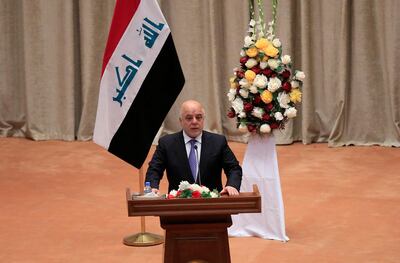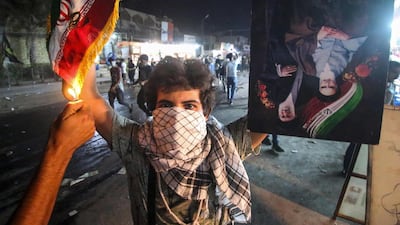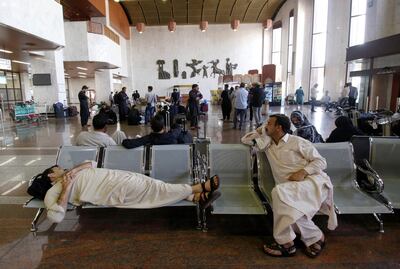Iraq's caretaker Prime Minister Haider Al Abadi faced calls to step down on Saturday as parliament held an emergency session to discuss the violence in Basra province, where three rockets were fired at the airport in the morning.
The airport attack followed a week of violent protests in which 12 people were killed and the Iranian consulate and government buildings torched and ransacked.
The call for Mr Al Abadi to quit came from the two largest groups in the newly elected parliament.
"We demand the government apologise to the people and resign immediately," said Hassan Al Aqouli, spokesman for the list of populist Shiite cleric Moqtada Al Sadr, which won the most seats in a May election.
Ahmed Al Assadi, spokesman for the second-largest Fatah Alliance list, denounced "the government's failure to resolve the crisis in Basra".
Mr Al Assadi said the Fatah Alliance was "on the same wavelength" as Mr Al Sadr's alliance and they would work together to form a new government.
The announcement deals a blow to Mr Al Abadi's hopes of holding on to his post through a coalition with Mr Al Sadr unveiled just days earlier.
During a cabinet meeting earlier, he described the unrest in Basra as "political sabotage" and said he had instructed security forces to "act decisively against the acts of vandalism that accompanied the demonstrations".
The prime minister also ordered the security forces to be investigated "for not fulfilling their duties", a statement from his office said.
Iraq's Joint Operations Command, which includes the army and police, vowed a "severe" response with "exceptional security measures", including a ban on protests and group travel.
Iraqi security sources said the three Katyusha rockets had been fired by unknown assailants and hit the perimeter of the airport, although no damage or casualties had been reported. The US Consulate is adjacent to Basra's airport.
An official said there was no disruption to operations and flights were taking off and landing as normal.
The attack came shortly after a citywide curfew was lifted and hours after the reopening of Iraq's main seaport Umm Qasr, where protesters had blocked the port's entrance, forcing a halt to all operations.
Also on Saturday, the local military commander of an alliance of powerful Shiite militias vowed to respond to the protests.
The commander, Abu Yasser Al Jaafari, held a news conference in the city. "We will have a response to those who are carrying out acts of arson and sabotage," he said.
Mr Al Jaafari said that the lack of a response so far should not be taken as a sign of weakness. He spoke at the city's presidential palaces compound, where Shiite paramilitary troops are stationed.
The wave of demonstrations first broke out in Basra in July, before spreading to other parts of the country, with angry residents condemning corruption among Iraqi officials and demanding jobs and basic services, including electricity and water.
A surge in illnesses has been blamed on the lack of clean drinking water. "More than 17,000 patients have been admitted to local hospitals – 2,600 are suffering from diarrhoea and the rest are suffering from issues related to stomach pains," Alaa Hashim, Basra's Health Ministry spokesman, told The National in August.
Residents and politicians say it is a symptom of the breakdown in public services caused by corruption and years of neglect by the central government in Baghdad.
_________
Read more:
Iraqi MPs to hold emergency session after Basra burns
Protesters set fire to government buildings in Basra - in pictures
Protesters in Basra attack offices of political parties and state-run TV channel
Protesters set Iranian consulate ablaze in Basra
_________
On Friday, protesters broke into the Iranian consulate's offices, shouting condemnation of what many perceive as Iran's sway over Iraq's political affairs, and set it alight. Iran and Iraq both strongly condemned the move, raising fears of possible retribution.
Three protesters died on Friday and 48 more were injured, 26 of whom were shot, sources said, while two members of the security force were wounded.
The unrest has thrust Iraq into a major crisis at a time when politicians have yet to agree a new government after an inconclusive election in May. The new parliament finally met for the first time on Monday, but broke up after a day having failed to elect a speaker, much less name a new prime minister.

Organisers of the demonstrations said they would pause protests on Saturday, while additional security forces have been deployed as back-up.
Residents in Basra, a city of more than two million people, say they have been driven to the streets by corruption and misrule that allowed infrastructure to collapse, leaving no power or safe drinking water in the heat of summer.
They say the water supply has become contaminated with salt, making them vulnerable and desperate in the hot summer months, and thousands of people have been hospitalised from drinking it.
At least 13 protesters have died, some in clashes with security forces, since Monday and dozens more have been wounded, the Basra Health Directorate and local health sources said.


